Baliwag
Baliuag | |
|---|---|
| City of Baliuag | |
     (From top, left to right): Baliwag Museum and Library (Old Town Hall) • Baliwag Transit terminal • Baliwag Clock Tower overviewing the Baliwag Wet and Dry Market • Mariano Ponce house birthplace marker • Baliwag Church | |
.png.webp) Flag  Seal | |
| Nickname: Buntal Hat Capital of the Philippines | |
| Motto(s): Dugong Baliwag, Pusong Baliwag (English: Baliwag by blood, Baliwag by heart) | |
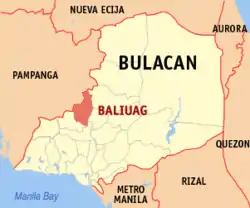 Map of Bulacan with Baliwag highlighted | |
OpenStreetMap | |
.svg.png.webp) Baliwag Location within the Philippines | |
| Coordinates: 14°57′14″N 120°54′04″E / 14.954°N 120.901°E | |
| Country | Philippines |
| Region | Central Luzon |
| Province | Bulacan |
| District | 2nd district |
| Founded | 1733 |
| Cityhood | December 17, 2022 |
| Barangays | 27 (see Barangays) |
| Government | |
| • Type | Sangguniang Panlungsod |
| • Mayor | Ferdinand V. Estrella |
| • Vice Mayor | Marie Claudette S. Quimpo |
| • Representative | Augustina Dominique C. Pancho |
| • City Council | Members |
| • Electorate | 107,076 voters (2022) |
| Area | |
| • Total | 45.05 km2 (17.39 sq mi) |
| Elevation | 18 m (59 ft) |
| Highest elevation | 44 m (144 ft) |
| Lowest elevation | 8 m (26 ft) |
| Population (2020 census)[3] | |
| • Total | 168,470 |
| • Density | 3,700/km2 (9,700/sq mi) |
| • Households | 43,789 |
| Demonyms | Baliwageño (male) Baliwageña (female) Baliwagenean |
| Economy | |
| • Poverty incidence | 3.98 |
| • Revenue | ₱ 655.3 million (2020) |
| • Assets | ₱ 1,168 million (2020) |
| • Expenditure | ₱ 659.6 million (2020) |
| • Liabilities | ₱ 428.7 million (2020) |
| Utilities | |
| • Electricity | Meralco |
| Time zone | UTC+8 (PST) |
| ZIP code | 3006 |
| PSGC | |
| IDD : area code | +63 (0)44 |
| Native languages | Tagalog Kapampangan |
Baliwag or Baliuag, officially the City of Baliwag (Tagalog: [bɐˈliʊag]; Filipino: Lungsod ng Baliwag), is a 1st class component city in the province of Bulacan, Philippines. According to the 2020 census, it has a population of 168,470 people.[3]
Baliuag was founded in 1732 by Augustinian friars and was incorporated by the Spanish Governor-General on May 26, 1733. It was carved out from the town of Quingua (now Plaridel).
Baliwag is 28 kilometers (17 mi) from Malolos and 51 kilometers (32 mi) from Manila.
Through the years of Spanish domination, Baliuag was predominantly agricultural. People had to depend on rice farming for the main source of livelihood. Orchards and tumanas yielded fruits and vegetables, which were sold in the public market. Commerce and industry also played important contributions to the economy of the people. Buntal hat weaving in Baliwag together with silk weaving popularly known in the world as Thai silk; the manufacturer of cigar cases, piña fibers, petates (mats), and Sillas de Bejucos (cane chairs) all of the fine quality became known in many parts of the world. The local market also grew. During the early part of the 19th century, Baliwag was already considered one of the most progressive and richest towns in Bulacan. The growth of the public market has significantly changed the model of the economy of the city.
Baliwag is the major commerce, transportation, entertainment, and educational center of Northern Bulacan. With the continuous expansion of Metro Manila, Baliwag is part of Manila's built-up area which reaches San Ildefonso, Bulacan at its northernmost part
On July 22, 2022, Republic Act No. 11929 lapsed into law. The said measure will convert the municipality into a component city and standardize its name as the City of Baliwag.[5] On December 17, 2022, a plebiscite was held,[6] 17,814 residents voted in favor of conversion to a component city while only 5,702 voted against.
Etymology
The name Baliwag is an old Kapampangan word for "untouched."[7]
History
Fr. Joaquín Martínez de Zúñiga, OSA, a friar, in his "1803 Historia de las Islas Filipinas"[8] wrote that the Convent or Parochial house of San Agustin, in Baliuag, is the best in the whole Archipelago and that no edifice in Manila can be compared to it in symmetry and beauty amid its towering belfry, having been a viewing point of the town's panorama. The frayle further stated that the Convent was a repository of priceless parish records that dated to the founding of Baliuag as a pueblo or parrochia by the OSA or Augustinians in 1733. But the first convent was erected at Barangay Santa Barbara, Baliuag before the Parokya was formally established at the now Plaza Naning, Poblacion.

Fr. Joaquín Martínez de Zúñiga arrived in the Philippines on August 3, 1786, and visited Baliuag on February 17, 1802, with Ignacio Maria de Álava y Sáenz de Navarrete. Their host was Baliuag's Parish Priest, Fray Esteban Diez Hidalgo.[9] Fr. Diez served as the longest cura parroco of Baliuag from 1789, having built the church and convent from 1790 to 1801.
Spanish records "Apuntes históricos de la provincia augustiniana del Santísimo Nombre de Jesús de Filipinas"[10] reveal that Fr. Juan de Albarran, OSA was assigned Parish Priest of Baliuag in 1733. The first baptism in Baliuag Church was ordered by Fr. Lector and Fr. Feliz Trillo, Provincial of the Province on June 7, 1933, while Baliuag was founded and began its de jure existence on May 26, 1733. The pueblo or town was created in the provincial Chapter on May 15, 1734, with the appointment of Fr. Manuel Bazeta/Baseta as first cura parroco.[11]
In 1769–1774, the Church of Baliuag was built by Father Gregorio Giner. The present structure (the third church to be rebuilt, due to considerable damage during the 1880 Luzon earthquakes) was later rebuilt by Father Esteban Diaz using mortar and stone. The 1866 Belfry was also completed by Father Matias Novoa but the July 19, 1880, quake damaged the same which was later repaired by Father Thomas Gresa.[12][13]
The earthquake of June 3, 1863, one of the strongest to ever hit Manila, destroyed the Governor's Palace in Intramuros. Malacañang then became the permanent residence of the head of the country. The massive quake also damaged the Baliuag Church.[14] In 1870, the reconstruction began when a temporary house of worship, the “Provincial”, along Año 1733 street, emerged as a narrow, and simple edifice which later used by the RVM Sisters of the Colegio de la Sagrada Familia (now St. Mary's College of Baliuag) as the classroom. Antonio de Mesa, “Maestrong Tonio" fabricated the parts to have finished the Spanish-era Baliuag Church.
Baliwag City was the 10th town founded by the Augustinians in the province of Bulacan.[15]
First Municipio
Baliuag had 30 curates (1733–1898): Fr. Esteban Diez Hidalgo and Fr. Fausto Lopez served 40 and 24 years, respectively. Fr. Lopez had 6 children with a beautiful native, Mariquita: Dr. Joaquin Gonzalez, Francisco, the former Assemblyman Ricardo Lloret Gonzales (Legislative districts of Bulacan, 5th Philippine Legislature), and Jose the eldest who was widely known as “Pepeng Mariquita", inter alia. Spanish cura parroco, Fr. Ysidoro Prada served in Baliuag during the last decade of the Spaniard regime.
The Philippine-American civil and military authorities supervised the first municipal elections, having chosen Baliuag as the site of the first Philippine elections of May 7, 1899.[16] The Filipinos gathered at the plaza of the St. Augustine Church after the Holy Mass, and thereafter the officials were selected based on the qualifications for voters set by the Americans.[17]
The first town Gobernadorcillo (1789 title) of Baliuag was Cap. Jose de Guzman.[18] He was assisted by the Tribunal's teniente mayor (chief lieutenant), juez de ganadas (judge of the cattle), juez de sementeras (judge of the field) and juez de policia (judge of the police). In the History of the Philippines (1521–1898), the 1893 Maura Law, the title of Gobernadorcillo became "capitan municipal" and that of each juez to teniente. From Baliuag's independence from Quingua, now Plaridel, Bulacan to 1898, 49 served as capitan, 13 alcalde and 92 as Gobernadorcillo. Felix de Lara (1782) and Agustin de Castro (1789) were the 1st alcalde and Gobernadorcillo, respectively. Municipal President Fernando Enrile, in 1908, honored some of these officials, even naming some of Baliuag calles in their honor, later. But all these political officials remained under the thumbs and the habito, of the autocratic Augustinian friars, the Baliuag Kura Parokos.
Don Mariano Ponce
Mariano Ponce was a native of Baliuag. He was a founding member of the Propaganda Movement together with José Rizal and Marcelo del Pilar; a former assemblyman of the second district of Bulacan to the Philippine Assembly; and the co-founder of La Solidaridad with fellow co-founder Graciano López-Jaena. His most common names are Naning (the Plaza Naning in Baliuag being named after his nickname); Kalipulako, named after the Cebuano hero Lapulapu; and Tagibalang or Tigbalang (Tikbalang), a supernatural being in Filipino folklore.[19]
American period
The local government of Baliuag used as first Municipio under the American regime (History of the Philippines (1898–1946)) the Mariano Yoyongko (Gobernadorcillo in 1885) Principalia in Poblacion (now a part of the market site), which it bought from Yoyongko.[20]
On September 15, 1915, Baliuag municipality bought the heritage mansion and a lot of Dr. Joaquin Gonzalez. The Gonzalez old mansion served as Lumang Municipio (the Old Municipio or Town Hall Building, as the seat of the local government) for 65 years. It is now the Baliuag Museum and Library.
Baliuag produced not less than 30 priests, including 3 during the Spanish-Dominican, and 2 Jesuits during the American regimes.
Jeorge Allan R. Tengco and Amy R. Tengco (wife of Lito S. Tengco), philanthropists, owners of Baliwag Transit and other chains of business establishments had been conferred the Papal Orders of Chivalry October 3, 2000 Pro Ecclesia et Pontifice and the 2012 Dame of the Order of St. Gregory the Great awards.[21]
Fifth Republic
On June 16, 1995, communist guerrilla Melencio Salamat Jr., a local leader of the New People's Army (NPA) in Bulacan, surrendered to the authorities along with 94 other members of the NPA at the Baliwag municipal building. Prior to the surrender, Salamat's group was responsible for collecting "revolutionary taxes" from residents along the coastal towns of Bulacan, and had chosen to give up arms after NPA officials were killed on April 28 in Barangay Catulinan, Baliwag.[22]
Cityhood

In 2018, the Sangguniang Bayan filed a resolution to request Bulacan 2nd District Representative Gavini Pancho, to file a house bill to convert Baliuag into a city.[23]
Representatives Eric Go Yap (ACT-CIS Partylist) and Paolo Duterte (Davao City–1st) filed House Bill No. 7362, seeking to convert Baliuag into a city.[24] House Bill No. 7362 was filed last August 12, 2020, for the conversion of the municipality of Baliuag into a component city in the province of Bulacan.[25] House Bill No. 10444, filed by the three aforementioned representatives, was concurred by the Senate and submitted to the President for signature on June 29, 2022, a day before the end of the 18th Congress.[26]

The bill lapsed into law without the President's signature on July 30, 2022 as Republic Act No. 11929.[27] The plebiscite was originally set by the Commission on Elections on January 14, 2023, but its date was later moved to December 17, 2022, following the postponement of the December 2022 Barangay and Sangguniang Kabataan Elections to October 2023.[28][29][30]
Despite having a low voter turnout,[31] majority of participated voters ratified the cityhood, making Baliwag the Bulacan's fourth component city and the country's 148th.[32][33][34]
| Choice | Votes | % |
|---|---|---|
| 17,814 | 75.75 | |
| No | 5,702 | 24.25 |
| Valid votes | 23,516 | 99.8% |
| Invalid or blank votes | 46 | 0.2% |
| Total votes | 23,562 | 100.00 |
| Registered voters/turnout | 108,572 | 21.7% |
| Source: Press statement from the COMELEC . news article from CNN Philippines | ||
Geography
Barangays
Baliwag is politically subdivided into 27 barangays. Each barangay consists of puroks and some have sitios.
| PSGC | Barangay | Population | ±% p.a. | |||
|---|---|---|---|---|---|---|
| 2020[3] | 2010[35] | |||||
| 031403001 | Bagong Nayon | 3.3% | 5,616 | 5,994 | −0.65% | |
| 031403002 | Barangca | 1.8% | 3,051 | 2,742 | 1.07% | |
| 031403003 | Calantipay | 1.7% | 2,784 | 2,613 | 0.64% | |
| 031403004 | Catulinan | 1.1% | 1,916 | 1,769 | 0.80% | |
| 031403005 | Concepcion | 5.9% | 9,933 | 9,585 | 0.36% | |
| 031403006 | Hinukay | 1.3% | 2,140 | 1,419 | 4.19% | |
| 031403007 | Makinabang | 7.0% | 11,715 | 11,196 | 0.45% | |
| 031403008 | Matangtubig | 1.6% | 2,630 | 2,859 | −0.83% | |
| 031403010 | Pagala | 2.3% | 3,843 | 3,139 | 2.04% | |
| 031403011 | Paitan | 0.9% | 1,517 | 1,440 | 0.52% | |
| 031403012 | Piel | 1.3% | 2,229 | 1,955 | 1.32% | |
| 031403013 | Pinagbarilan | 3.2% | 5,357 | 5,178 | 0.34% | |
| 031403014 | Poblacion. | 5.6% | 9,448 | 9,668 | −0.23% | |
| 031403016 | Sabang | 6.7% | 11,350 | 11,960 | −0.52% | |
| 031403017 | San Jose | 3.9% | 6,575 | 5,346 | 2.09% | |
| 031403018 | San Roque | 2.1% | 3,554 | 3,402 | 0.44% | |
| 031403019 | Santa Barbara | 6.9% | 11,676 | 11,568 | 0.09% | |
| 031403020 | Santo Cristo | 5.2% | 8,840 | 8,650 | 0.22% | |
| 031403021 | Santo Niño | 2.3% | 3,818 | 3,470 | 0.96% | |
| 031403022 | Subic | 3.3% | 5,506 | 4,550 | 1.93% | |
| 031403023 | Sulivan | 3.0% | 5,070 | 4,776 | 0.60% | |
| 031403024 | Tangos | 3.4% | 5,699 | 5,578 | 0.21% | |
| 031403025 | Tarcan | 4.4% | 7,333 | 6,892 | 0.62% | |
| 031403026 | Tiaong | 3.0% | 5,006 | 4,903 | 0.21% | |
| 031403027 | Tibag | 1.8% | 3,014 | 3,746 | −2.15% | |
| 031403028 | Tilapayong | 2.0% | 3,389 | 2,494 | 3.11% | |
| 031403030 | Virgen delas Flores | 4.1% | 6,945 | 6,673 | 0.40% | |
| Total | 168,470 | 143,565 | 1.61% | |||
Climate
| Climate data for Baliwag | |||||||||||||
|---|---|---|---|---|---|---|---|---|---|---|---|---|---|
| Month | Jan | Feb | Mar | Apr | May | Jun | Jul | Aug | Sep | Oct | Nov | Dec | Year |
| Mean daily maximum °C (°F) | 28 (82) |
29 (84) |
31 (88) |
33 (91) |
32 (90) |
31 (88) |
30 (86) |
29 (84) |
29 (84) |
30 (86) |
30 (86) |
28 (82) |
30 (86) |
| Mean daily minimum °C (°F) | 20 (68) |
20 (68) |
21 (70) |
22 (72) |
24 (75) |
24 (75) |
24 (75) |
24 (75) |
24 (75) |
23 (73) |
22 (72) |
21 (70) |
22 (72) |
| Average precipitation mm (inches) | 6 (0.2) |
4 (0.2) |
6 (0.2) |
17 (0.7) |
82 (3.2) |
122 (4.8) |
151 (5.9) |
123 (4.8) |
124 (4.9) |
99 (3.9) |
37 (1.5) |
21 (0.8) |
792 (31.1) |
| Average rainy days | 3.3 | 2.5 | 11.7 | 6.6 | 17.7 | 22.2 | 25.2 | 23.7 | 23.2 | 17.9 | 9.2 | 5.2 | 168.4 |
| Source: Meteoblue [36] | |||||||||||||
Demographics
| Year | Pop. | ±% p.a. |
|---|---|---|
| 1903 | 15,936 | — |
| 1918 | 18,254 | +0.91% |
| 1939 | 22,972 | +1.10% |
| 1948 | 30,670 | +3.26% |
| 1960 | 37,409 | +1.67% |
| 1970 | 52,133 | +3.37% |
| 1975 | 61,624 | +3.41% |
| 1980 | 70,555 | +2.74% |
| 1990 | 89,719 | +2.43% |
| 1995 | 103,054 | +2.63% |
| 2000 | 119,675 | +3.26% |
| 2007 | 136,982 | +1.88% |
| 2010 | 143,565 | +1.72% |
| 2015 | 149,954 | +0.83% |
| 2020 | 168,470 | +2.32% |
| Source: Philippine Statistics Authority[37][35][38][39] | ||
In the 2020 census, the population of Baliwag, Bulacan, was 168,470 people,[3] with a density of 3,700 inhabitants per square kilometer or 9,600 inhabitants per square mile.
Religion
Baliwag at present has six Roman Catholic parishes, a sub-parish and a quasi-parish under the administration of Diocese of Malolos. Their patron saint of Baliwag is St. Augustine because Baliwag was founded by the Augustinians in 1733. Other Christian denominations are also present in the city, including Iglesia ni Cristo, The Church of Jesus Christ of Latter-day Saints, Members Church of God International, Bible Baptist Church and Evangelical Christianity.
Economy
Economy of Baliwag, Bulacan | |
|---|---|
   Baliwag Town Proper | |
2017 Financial Highlights[47] | |
Financial Conditions
| |
Results of Operations
| |
Sources and Application of Funds
| |
Major industries
- Garments
- Pyrotechnics
- Food/Food Processing
- Furniture
- Swine
- Chicken Production
- Automobile Industry
Major products
- Buntal Hat and Bags
- Bakeries (Native Pandesal, Ensaymada, Spanish Bread)
- Native Delicacies (Chicharon, Puto, Pastillas de Leche)
- Lechon Manok (famously Baliwag Lechon Manok)
Malls and supermarkets
- SM City Baliwag
- A Square
- Puregold Baliwag
- Puregold DRT Highway
- Puregold Tangos
- Super8 Grocery Warehouse
- Savemore Supermarket
- Ultra Mega Supermarket
- Unitop Baliwag
- Megamart Baliwag
- RCS
- Waltermart Mall Baliwag
- NSN
- S&R Mall Baliwag (U/C)
- Ayala Mall Baliwag (U/C)
- SKY RANCH Baliwag (U/C)
Government
Local government

| Position | Name | Party | |
|---|---|---|---|
| Mayor | Ferdinand "Ferdie" V. Estrella | PDP–Laban | |
| Vice Mayor | Marie Claudette "Madette" S. Quimpo | NUP | |
| Councilors | Maria Isabel "Mabel" G. Pascual | Lakas | |
| Jose Noel "Joel" S. Pascual | PDP–Laban | ||
| Karlo Kenneth "Kenneth" M. Cruz | PDP–Laban | ||
| Carolina "Carol" L. Dellosa | NUP | ||
| Rodrigo "Ogie" E. Baltazar | PDP–Laban | ||
| Antonio "Tony" S. Patawaran | PDP–Laban | ||
| Emmanuel "Manny" T. Balicanta | PDP–Laban | ||
| Marie Nelle "Bhang" S. Imperial | PDP–Laban | ||
| Ex Officio Municipal Council Members | |||
| ABC President | Michael Ramos Lopez (Santo Cristo) | Nonpartisan | |
| SK Federation President | Casey Estrella Howard (Poblacion) | Nonpartisan | |
List of former mayors
| No. | Presidente Municipal | Took office | Left office |
|---|---|---|---|
| 1 | Francisco Guerrero | 1899 | 1899 |
| 2 | Jose Rustia | 1900 | 1900 |
| 3 | Ancieto Valencia | 1901 | 1903 |
| 4 | Dr. Domingo M. Enrile | 1904 | 1905 |
| 5 | Jose Lajom | 1906 | 1907 |
| 6 | Fernando Enrile | 1908 | 1909 |
| 7 | Martin H. Prado | 1910 | 1912 |
| 8 | Juan Racelis | 1913 | 1918 |
| 9 | Pablo Camacho | 1919 | 1922 |
| 10 | Emilio Rustia | 1922 | 1925 |
| 11 | Pedro R. Mateo | 1925 | 1930 |
| 12 | Dr. Peregrino E. Sauco | 1931 | 1934 |
| 13 | Atty. Wenceslao Ortega | 1934 | 1937 |
| No. | Alcalde | Took office | Left office |
| 1 | Dr. Guilermo dela Merced | 1938 | 1941 |
| 2 | Rafael Chico | 1942 | 1945 |
| No. | Municipal Mayors | Took office | Left office |
| 1 | Maj. Servando C. Santos | 1946 | 1955 |
| 2 | Roberto E. Chico | 1956 | 1959 |
| 3 | Felix Tiongson | 1960 | 1963 |
| 4 | Roberto E. Chico | 1964 | 1967 |
| 5 | Florentino Vergel de Dios | 1968 | March 1980 |
| 6 | Dominador Enrile | March 1980 | September 1981 |
| 7 | Leonardo C. Mananghaya | September 1981 | May 1986 |
| 8 | Atty. Emilio Camacho Santos (OIC) | May 1986 | February 1988 |
| 9 | Reynaldo S. del Rosario | February 1988 | June 1992 |
| 10 | Cornelio P. Trinidad | 1992 | November 16, 1994[50] |
| 11 | Edilberto S. Tengco | November 1994 | June 1998 |
| 12 | Rolando F. Salvador | July 1998 | June 2004 |
| 13 | Romeo M. Estrella | July 2004 | June 2013 |
| 14 | Carolina L. Dellosa, M.D | July 2013 | June 2016 |
| 15 | Ferdinand V. Estrella | July 2016 | December 17, 2022 |
| No. | City Mayors | Took office | Left office |
| 1 | Ferdinand V. Estrella | December 17, 2022 | present |
City seal
According to Republic Act No. 11929, the official seal of the city shall be circular in form with the dominant colors of green and blue representing the city's vision to promote economic and social progress, sustainable development, and technological advancement. The year 2022 at the center upper part of the official seal indicates the year that Baliwag became a component city. The building structure represents the facade of the town’s seat of government. On top of this image is the year 1733, when Baliwag was founded by the Augustinians. The official seal shall display rice stalks to indicate that the City of Baliwag maintains its commitment to national food security as one of the top rice yielders in the Province of Bulacan. The Baliwag buntal hat, a product woven in this City and is regarded as superior in quality to other types of buntal hats produced in the country, is likewise depicted in the official seal. The City of Baliwag may alter its official seal, provided that any change of the seal shall be approved by Congress and registered with the Department of the Interior and Local Government (DILG).[51]
Tourism
- Baliwag Clock Tower
- Baliwag is the home of the first self-supporting clock tower in Bulacan, which is a heritage attraction in the city.
- Lenten Processions
- Baliwag is known for its Semana Santa (Holy Week) processions, which are among the longest religious processions in the Philippines. As of 2019, the procession hosts a record 124 (121, with 3 additional) carros or carrozas (floats) with life-sized santos (statues) joined in the parade showcasing events from the life and passion of Christ.
- Buntal Hat Festival
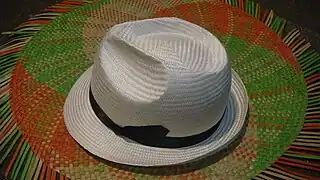 A buntal hat from Baliwag
A buntal hat from Baliwag
Buntal Hat Festival is a celebration of the culture of buntal hat making in the city that is simultaneously celebrated with Mother's Day annually. Early versions of the buntal hat were wide-brimmed farmer's hats and used unsoftened strips of buntal fiber. The industry expanded into Baliwag, Bulacan between 1907 and 1909, originally introduced by Mariano Deveza who originally hailed from Lucban, Quezon. Colorful and grandiose decorations and street dancing are the highlights of this celebration.
Other attractions
- 3006 Augustine Square (A. Square)
- Baliwag Glorietta Park
- Baliwag Museum and Library (Lumang Municipio)
- Mariano Ponce Ancestral House Museum
- The Greenery Events Place
- The Baliwag Star Arena
- Jose Rizal Monument at Plaza Naning
- Baliwag Pasalubong Center
- Parish Museum of Old Religious Artifacts (Parish of St. Augustine)
- Carozza Makers
- Artisan Street (Bone In-Lay Handicrafts)
- Baliwag Heroes’ Park
- Baliwag Night Market
- Baliwag Christmas Night Market
- The Chapters
- Tate Haus, Baliwag's Premiere Resort.
Transportation

Public transportation in Baliwag is served by provincial buses, jeepneys, UV Express AUVs, and intra-municipal tricycles.
Baliwag Transit, Inc., one of the largest bus transportation system in the Philippines, is headquartered in Barangay Sabang. It mainly services routes to and from Metro Manila and Central Luzon.
There are three major transport lines in the municipality: The Baliwag-Candaba (Benigno S. Aquino Avenue) road going to Pampanga (from the Downtown Baliwag to Candaba Town Proper), the Old Cagayan Valley road (Calle Rizal) and the Dona Remedios Trinidad Highway (N1, AH26) going to Manila and Nueva Ecija. The city is located 52 kilometers north of Manila, the capital of the Philippines.
Education
There are public and private educational institutions found in Baliwag.
Tertiary education
- Baliuag University – is the first school granted full autonomy in Region III by the Commission on Higher Education (CHED) in 2001.
- Baliuag Polytechnic College – is a public tertiary and vocational education institution in Baliwag.
- Fernandez College of Arts and Technology
- St. Mary's College of Baliuag – is a co-ed (mixed-sex) Catholic school founded in 1912 and administered by the Religious of the Virgin Mary, the first pontifically approved congregation for women in the Philippines.
- STI College
- ACLC
- Marian College Of Baliwag
- National University Bulacan - SM City Baliwag
Primary and secondary education
Here are some of the school's offers between primary and secondary education;
Public
- Mariano Ponce National High School
- Sto. Niño High School
- Virgen Delas Flores High School
- Sulivan High School
- Teodoro Evangelista Memorial High School (a school between Baliwag and Bustos)
- Tilapayong Elementary School
- San Jose Elementary School
- Concepcion Elementary School
- Sabang Elementary School
- Baliwag North Central School
- Baliwag South Central School
- Catulinan Elementary School
- Pinagbarilan Elementary School
- Hinukay Elementary School
- Engr. Vicente R. Cruz Memorial School
Private
- Immaculate Concepcion School of Baliwag
- Montessori De Sagrada Familia
- Baliuag Alliance Christian Academy
- Living Angels Christian Academy
- Saint Jean Baptiste Academy Inc
- The Catholic Servants of Christ Community
Gallery
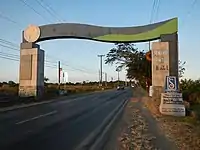 Baliwag Welcome Arch from Pulilan, Bulacan
Baliwag Welcome Arch from Pulilan, Bulacan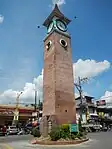 Baliwag Clock tower
Baliwag Clock tower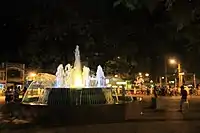 Baliwag Glorietta Park at night
Baliwag Glorietta Park at night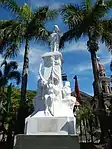 Ang Baliwag kay Rizal Monument
Ang Baliwag kay Rizal Monument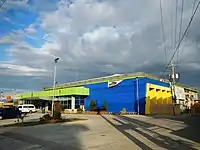 Baliwag Star Arena
Baliwag Star Arena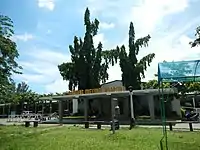 Baliwag District Hospital
Baliwag District Hospital TATE HAUS
TATE HAUS
See also
- Good Friday processions in Baliwag
- Saint Augustine Parish Church (Baliwag)
- Baliuag Museum and Library
- Sub-Parish Church of Santo Cristo
- Lady of Most Holy Rosary Parish Church
- Fernandez College of Arts and Technology
- Baliuag University
- St. Mary's College of Baliuag
- Baliwag Transit
- SM City Baliwag
- Dr. Joaquin Gonzalez
References
- ↑ City of Baliwag | (DILG)
- ↑ "2015 Census of Population, Report No. 3 – Population, Land Area, and Population Density" (PDF). Philippine Statistics Authority. Quezon City, Philippines. August 2016. ISSN 0117-1453. Archived (PDF) from the original on May 25, 2021. Retrieved July 16, 2021.
- 1 2 3 4 Census of Population (2020). "Region III (Central Luzon)". Total Population by Province, City, Municipality and Barangay. Philippine Statistics Authority. Retrieved July 8, 2021.
- ↑ "PSA Releases the 2018 Municipal and City Level Poverty Estimates". Philippine Statistics Authority. December 15, 2021. Retrieved January 22, 2022.
- ↑ People's Television Network [@PTVph] (August 3, 2022). ""TINGNAN: Listahan ng mga panukalanang nag-lapse into law at vetoed bills, inilabas ng Malacañang" (Tweet) (in Tagalog). Retrieved August 5, 2022 – via Twitter.
- ↑ "Comelec finishes ballot printing for Baliwag plebiscite".
- ↑ Crossing a river, their 'itlog' turns to 'ebun' on Philstar.com
- ↑ MARTINEZ de ZUÑIGA OSA, Fr Joaquín [in Spanish] (1803). Historia de las Islas Philipinas (2 vols) (in Spanish). Sampaloc: Impreso por Fr. Pedro Argüelles de la Concepción. OCLC 30062450.
- ↑ "www.baliwag.net". Archived from the original on October 12, 2013. Retrieved March 30, 2013.
- ↑ "Apuntes históricos de la provincia augustiniana del Santísimo Nombre de Jesús de Filipinas : a... - National Library of Australia". nla.gov.au. Retrieved June 24, 2015.
- ↑ ".:: The majestic Basilica Minore del Santo Niño | Choose Philippines | Travel Articles ::". choosephils.com. Archived from the original on October 6, 2012. Retrieved January 17, 2022.
- ↑ "Protected Blog". wordpress.com. May 21, 2011. Retrieved June 24, 2015.
- ↑ "Visita Iglesia: The old churches of Bulacan, Part 1 of 2". Simbahan. Retrieved June 24, 2015.
- ↑ Malacañang Palace#Etymology
- ↑ "Baliwag City – Provincial Government of Bulacan". bulacan.gov.ph. Retrieved September 23, 2023.
- ↑ Balabo, Dino (May 7, 2007). "Baliuag marks 108 years of town elections". The Philippine Star. Retrieved December 31, 2012.
- ↑ "Baliuag marks 108 years of town elections". The Philippine Star. Retrieved June 24, 2015.
- ↑ "Baliwag.net". Archived from the original on October 12, 2013. Retrieved January 7, 2013.
- ↑ "Mariano Ponce". Official Website of the Provincial Government of Bulacan. Archived from the original on October 20, 2018. Retrieved June 29, 2018.
- ↑ "Multiply.com". Archived from the original on March 4, 2016. Retrieved June 24, 2015.
- ↑ "History of Baliuag, Bulacan". Archived from the original on January 3, 2011. Retrieved January 12, 2011.
- ↑ Reyes, Carmela (June 17, 1995). "NPA leader, 94 others surrender in Bulacan". Manila Standard. Standard Publications, Inc. p. 5. Retrieved June 20, 2023.
- ↑ "Mayor Ferdie, SB, 27 Kapitan, SK, at Sectoral Groups, Pormal na isinalin ang Cityhood Documents kay Cong. Apol Pancho". Baliuag News Online. August 1, 2018. Retrieved September 24, 2020.
- ↑ "Measure converting Baliuag town into a city up in Congress". Philippines Graphic. September 12, 2020. Retrieved September 24, 2020.
- ↑ House Bill No. 7362 (August 12, 2020), An Act Converting the Municipality of Baliuag Into a Component City to Be Known as Baliwag City, retrieved June 21, 2023
- ↑ Bacelonia, Wilnard (May 23, 2022). "Senate approves 2 bills seen to boost Bulacan's economy". Philippine News Agency. Retrieved June 21, 2023.
- ↑ Republic Act No. 11929 (July 30, 2022), An Act Converting the Municipality of Baliwag In the Province of Bulacan Into a Component City to Be Known as the City of Baliwag (PDF), retrieved June 21, 2023
- ↑ "Bulacan town plebiscite on Jan 14". Manila Bulletin. September 14, 2022. Retrieved December 17, 2022.
- ↑ "Baliwag cityhood plebiscite moved to December 17". The Philippine Star. October 27, 2022. Retrieved December 17, 2022.
- ↑ "Baliwag plebiscite moved to Dec. 17 from January 2023". Philippine News Agency. October 26, 2022. Retrieved December 17, 2022.
- ↑ "Comelec not expecting high voter turnout in Baliwag plebiscite". SunStar. December 17, 2022. Retrieved December 17, 2022.
- ↑ "Baliwag town now a component city of Bulacan — Comelec". CNN Philippines. December 18, 2022. Retrieved December 18, 2022.
- ↑ "Baliwag, Bulacan residents vote to convert their town into city". Rappler. December 17, 2022. Retrieved December 18, 2022.
- ↑ "FAST FACTS: Plebiscite seeking to convert Baliwag town into a city". Rappler. December 16, 2022. Retrieved December 18, 2022.
- 1 2 Census of Population and Housing (2010). "Region III (Central Luzon)" (PDF). Total Population by Province, City, Municipality and Barangay. National Statistics Office. Retrieved June 29, 2016.
- ↑ "Baliwag: Average Temperatures and Rainfall". Meteoblue. Retrieved May 12, 2020.
- ↑ Census of Population (2015). "Region III (Central Luzon)". Total Population by Province, City, Municipality and Barangay. Philippine Statistics Authority. Retrieved June 20, 2016.
- ↑ Censuses of Population (1903–2007). "Region III (Central Luzon)". Table 1. Population Enumerated in Various Censuses by Province/Highly Urbanized City: 1903 to 2007. National Statistics Office.
{{cite encyclopedia}}: CS1 maint: numeric names: authors list (link) - ↑ "Province of". Municipality Population Data. Local Water Utilities Administration Research Division. Retrieved December 17, 2016.
- ↑ "Poverty incidence (PI):". Philippine Statistics Authority. Retrieved December 28, 2020.
- ↑ "Estimation of Local Poverty in the Philippines" (PDF). Philippine Statistics Authority. November 29, 2005.
- ↑ "2003 City and Municipal Level Poverty Estimates" (PDF). Philippine Statistics Authority. March 23, 2009.
- ↑ "City and Municipal Level Poverty Estimates; 2006 and 2009" (PDF). Philippine Statistics Authority. August 3, 2012.
- ↑ "2012 Municipal and City Level Poverty Estimates" (PDF). Philippine Statistics Authority. May 31, 2016.
- ↑ "Municipal and City Level Small Area Poverty Estimates; 2009, 2012 and 2015". Philippine Statistics Authority. July 10, 2019.
- ↑ "PSA Releases the 2018 Municipal and City Level Poverty Estimates". Philippine Statistics Authority. December 15, 2021. Retrieved January 22, 2022.
- ↑ ""Commission on Audit Financial Report 2016-Baliuag"". Quezon City, Philippines: Commission on Audit (COA). Retrieved June 29, 2018.
- ↑ ""Local Results-Baliuag"". Quezon City: GMA. Retrieved May 21, 2022.
- ↑ ""Sangguniang Kabataan, Sumasailalim sa Pagsasanay. SK Chair Jaime Viceo IV ng Santa Barbara nahalal na SK Federation President."". Baliuag, Bulacan: Baliwag City News Online. Retrieved June 29, 2018.
- ↑ Catindig, C. (November 18, 1994). "Baliuag mayor is dead". Manila Standard. Kamahalan Publishing Corp. p. 28. Retrieved November 12, 2022.
One of the two mayors running simultaneously the government of Baliuag, Bulacan — Cornelio P. Trinidad — died of a liver ailment at a private hospital in Manila on Wednesday evening [November 16].
- ↑ "Republic Act No. 11929: AN ACT CONVERTING THE MUNICIPALITY OF BALIWAG IN THE PROVINCE OF BULACAN INTO A COMPONENT CITY TO BE KNOWN AS THE CITY OF BALIWAG" (PDF). Senate of the Philippines. Retrieved December 17, 2022.
External links
- Local Government Unit: Municipality of Baliwag
- Baliwag Bulacan
- Philippine Standard Geographic Code
- Philippine Census Information
- Baliwag Official Site
- BALIWAG-eBOOK, a five volume history of Baliwag: Volumes I II III IV V, Baliwag Society International
